Do What the Spirits Say Do
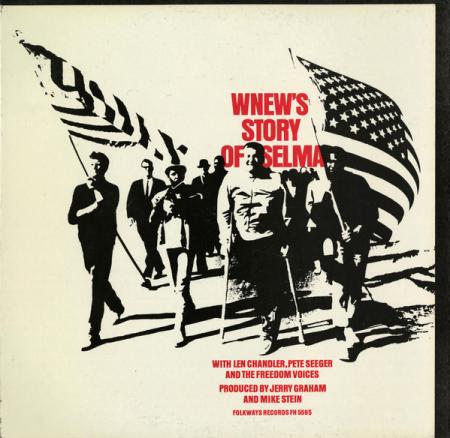
I'm gonna do what the spirits say do,
(continua)
(continua)
inviata da Pluck 29/8/2023 - 18:11
Murder on the Roads of Alabama
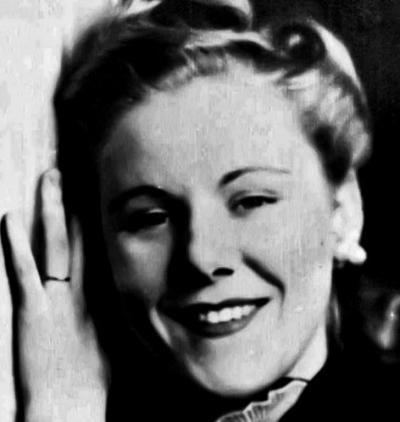
Murder on the Roads of Alabama - Len Chandler - 1965
Nota introduttiva di Len Chandler.
"It was on Highway 80 on my way to Selma,when we passed about
30 or 40 police cars and lots of lights and lots of activity and we thought that the car we saw poked half way through a fence off the right side of the road has just been involved in a accident. We uh found out that a lady had been shot to death on Highway 80 ".
da : WNEW's Story of Selma
Civil Rights Movement Archive
https://www.crmvet.org › 65_selma_wnew_liner
Nota introduttiva di Len Chandler.
"It was on Highway 80 on my way to Selma,when we passed about
30 or 40 police cars and lots of lights and lots of activity and we thought that the car we saw poked half way through a fence off the right side of the road has just been involved in a accident. We uh found out that a lady had been shot to death on Highway 80 ".
da : WNEW's Story of Selma
Civil Rights Movement Archive
https://www.crmvet.org › 65_selma_wnew_liner
Oh, it's murder on the roads of Alabama,
(continua)
(continua)
inviata da Pluck 28/8/2023 - 12:07
I Love Everybody
anonimo
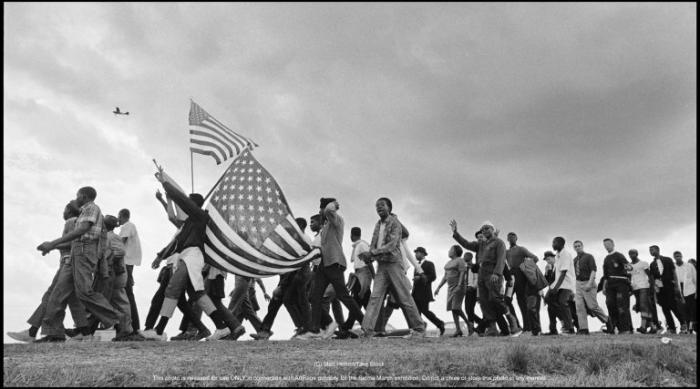
Testo adattato della traccia cantata dai manifestanti durante la marcia per i Diritti Civili da Selma a Montgomery , Alabama, nel 1965
da: Civil Rights Movement Archive
https://www.crmvet.org › 65_selma_wnew_liner
RADIO STATION - WNEW's Story of Selma, 1965.
With Len Chandler, Pete Seeger and The Freedom Voices
p. 4/8
I Love Everybody.
da: Civil Rights Movement Archive
https://www.crmvet.org › 65_selma_wnew_liner
RADIO STATION - WNEW's Story of Selma, 1965.
With Len Chandler, Pete Seeger and The Freedom Voices
p. 4/8
I Love Everybody.
PETE : There are batches of young women - some of them teenage girls - right in back of where my wife and I were walkin'. They came out with a couple of verses that gave me pause to think and I realize that this March had something unique in the whole world . Anybody in America that thought that this March was full of a bunch of angry people, you know, shouting out malignant thoughts and … on the contrary it was one of the most happy.... purely joyful thing you could imagine. This is what these girls were singing ….
(continua)
(continua)
inviata da Pluck 27/8/2023 - 18:12
Move on Over
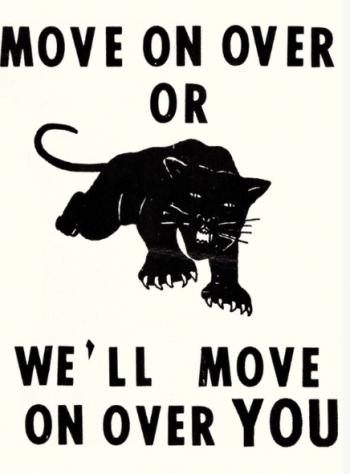
(1965)
Lyrics by Len Chandler
Tune: Battle Hymn of the Republic (or John Brown's Body)
See: Black Nationalism and Militancy :: 20th Century History Song Book
According to 'Everybody Says Freedom: A History of the Civil Rights Movement in Songs and Pictures' by Pete Seeger this was created by Len Chandler for a 1965 commemoration in NYC of the failed raid on the military arsenal Harpers Ferry in 1859. The song mentions leader of the attack John Brown, who picked up arms in order to defend fugitive slaves. He was arrested, convicted of treason and hanged.
comment by Protest Songs on youtube
Lyrics by Len Chandler
Tune: Battle Hymn of the Republic (or John Brown's Body)
See: Black Nationalism and Militancy :: 20th Century History Song Book
According to 'Everybody Says Freedom: A History of the Civil Rights Movement in Songs and Pictures' by Pete Seeger this was created by Len Chandler for a 1965 commemoration in NYC of the failed raid on the military arsenal Harpers Ferry in 1859. The song mentions leader of the attack John Brown, who picked up arms in order to defend fugitive slaves. He was arrested, convicted of treason and hanged.
comment by Protest Songs on youtube
Mine eyes have seen injustice in each city, town and state
(continua)
(continua)
18/8/2021 - 23:56
Which Side Are You On?
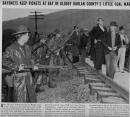
Broadside #57, Aprile 1965
Note: This new set of words to the Kentucky miner's song of the 1930's, was brought to Broadside by Len Chandler in the fall of 1964 when he returned from a summer of activity in the Freedom Hovement in Mississippi. It was sung extensively there and recently by the Selma, Alabama, marchers
Tune: Which Side Are You On by Mrs. Florence
Note: This new set of words to the Kentucky miner's song of the 1930's, was brought to Broadside by Len Chandler in the fall of 1964 when he returned from a summer of activity in the Freedom Hovement in Mississippi. It was sung extensively there and recently by the Selma, Alabama, marchers
Tune: Which Side Are You On by Mrs. Florence
Come all you bourgeoise black men
(continua)
(continua)
inviata da dq82 4/11/2016 - 11:14
Carry It On

[1964]
Parole e musica di Gil Turner (1933-1974), cantautore, attore ed attivista politico, l’autore di Let Me Die In My Footsteps resa celebre da Dylan.
Testo pubblicato in Broadside # 45, 1964
Interpretata da The Broadside Singers (Len Chandler, Tom Paxton e altri) nella raccolta “ Broadside Ballads Vol. 3”, 1964
Poi nella raccolta “The Best of Broadside 1962-1988: Anthems of the American Underground from the Pages of Broadside Magazine” realizzata dalla Smithsonian Folkways Recordings nel 2000.
Siccome David Harris, il marito della Baez, fu arrestato per renitenza alla leva nel 1969, è evidente che questa canzone fu concepita per raccontare altro, cioè le violenze della polizia contro i manifestanti per i diritti civili. Il ripetuto richiamo all’uso dei cani durante la repressione ne è la prova.
Evidentemente più tardi la Baez la fece propria per raccontare la vicenda del compagno e passò ad essere considerata una canzone contro la guerra in Vietnam.
Parole e musica di Gil Turner (1933-1974), cantautore, attore ed attivista politico, l’autore di Let Me Die In My Footsteps resa celebre da Dylan.
Testo pubblicato in Broadside # 45, 1964
Interpretata da The Broadside Singers (Len Chandler, Tom Paxton e altri) nella raccolta “ Broadside Ballads Vol. 3”, 1964
Poi nella raccolta “The Best of Broadside 1962-1988: Anthems of the American Underground from the Pages of Broadside Magazine” realizzata dalla Smithsonian Folkways Recordings nel 2000.
Siccome David Harris, il marito della Baez, fu arrestato per renitenza alla leva nel 1969, è evidente che questa canzone fu concepita per raccontare altro, cioè le violenze della polizia contro i manifestanti per i diritti civili. Il ripetuto richiamo all’uso dei cani durante la repressione ne è la prova.
Evidentemente più tardi la Baez la fece propria per raccontare la vicenda del compagno e passò ad essere considerata una canzone contro la guerra in Vietnam.
CARRY IT ON
(continua)
(continua)
inviata da Bernart Bartleby 4/8/2015 - 11:31
I’m Going to Get My Baby Out of Jail
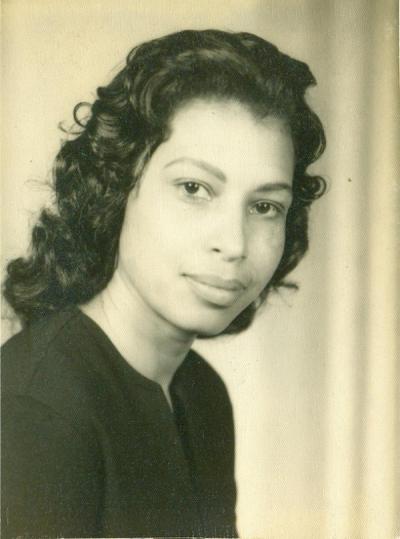
[1964]
Parole di Len Chandler
Sulla melodia di un’altra sua canzone, “I Had To Stand And Stare”
Testo pubblicato su in Broadside #51, 1964
Interpretata da Bernice Johnson Reagon nella raccolta “Broadside Ballads Vol. 6”, 1964
Poi nella raccolta “The Best of Broadside 1962-1988: Anthems of the American Underground from the Pages of Broadside Magazine” realizzata dalla Smithsonian Folkways Recordings nel 2000.
Una canzone scritta su uno dei tanti, quotidiani episodi di discriminazione e segregazione razziale contro cui in quegli anni era impegnato il movimento per i diritti civili…
A Orangeburg, South Carolina, Gloria Rackley, un’afroamericana in stato di gravidanza inoltrata, si presentò in ospedale e chiese di essere visitata ma si rifiutò di accedere all’area riservata alle persone di colore. Anziché ricevere assistenza fu arrestata. Lei rifiutò di pagare la pur esigua cauzione per... (continua)
Parole di Len Chandler
Sulla melodia di un’altra sua canzone, “I Had To Stand And Stare”
Testo pubblicato su in Broadside #51, 1964
Interpretata da Bernice Johnson Reagon nella raccolta “Broadside Ballads Vol. 6”, 1964
Poi nella raccolta “The Best of Broadside 1962-1988: Anthems of the American Underground from the Pages of Broadside Magazine” realizzata dalla Smithsonian Folkways Recordings nel 2000.
Una canzone scritta su uno dei tanti, quotidiani episodi di discriminazione e segregazione razziale contro cui in quegli anni era impegnato il movimento per i diritti civili…
A Orangeburg, South Carolina, Gloria Rackley, un’afroamericana in stato di gravidanza inoltrata, si presentò in ospedale e chiese di essere visitata ma si rifiutò di accedere all’area riservata alle persone di colore. Anziché ricevere assistenza fu arrestata. Lei rifiutò di pagare la pur esigua cauzione per... (continua)
I’m goin’ to get my baby outa jail
(continua)
(continua)
inviata da Bernart Bartleby 4/8/2015 - 09:28
Beans in My Ears
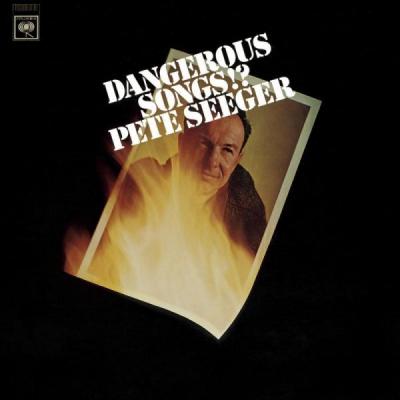
Beans in My Ears is a song created and sung by protest singer, Len Chandler. It became a hit single when covered by The Serendipity Singers, reaching #30 in June, 1964. Doctors protested that many children were actually putting beans in their ears and so it was banned in some places such as Boston. It was also covered by Lonnie Donegan in 1964.
The insistent chorus goes
The song was covered by Pete Seeger in his 1966 album Dangerous Songs!?. Seeger's version satirically attacked Lyndon B. Johnson's involvement in the Vietnam War. In addition to Chandler's original lyrics, Seeger sang that "Mrs. Jay's little son Alby" had "beans in his ears", which, as the lyrics imply, ensures that a person does not hear what is said to them. To those opposed to continuing the Vietnam War, the phrase suggested that "Alby Jay", a loose pronunciation of Johnson's nickname "LBJ", did not listen to anti-war protests as he too had "beans in his ears".
Wikipedia
The insistent chorus goes
My mommy said not to put beans in my ears, beans in my ears, beans in my ears.
The song was covered by Pete Seeger in his 1966 album Dangerous Songs!?. Seeger's version satirically attacked Lyndon B. Johnson's involvement in the Vietnam War. In addition to Chandler's original lyrics, Seeger sang that "Mrs. Jay's little son Alby" had "beans in his ears", which, as the lyrics imply, ensures that a person does not hear what is said to them. To those opposed to continuing the Vietnam War, the phrase suggested that "Alby Jay", a loose pronunciation of Johnson's nickname "LBJ", did not listen to anti-war protests as he too had "beans in his ears".
Wikipedia
My mommy said not to put beans in my ears
(continua)
(continua)
2/7/2010 - 00:14
×
![]()


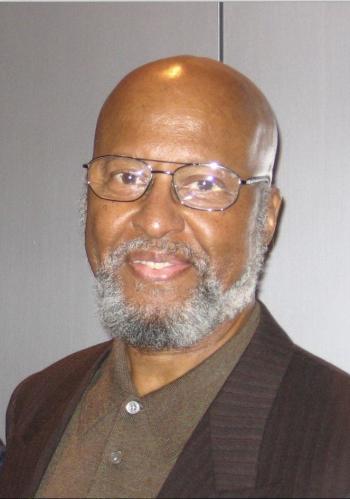

Nota introduttiva di Len Chandler :
da : RADIO STATION WNEW'S STORY OF SELMA
1965 Folkways Records Album No. FH 5595